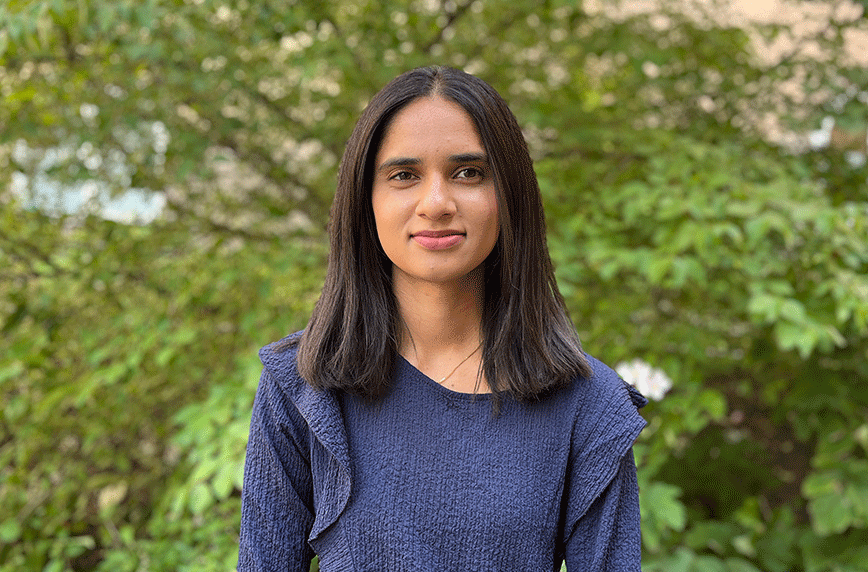Isma
Isma is from Pakistan but moved to Spain when she was five. Before coming to Sweden, she completed her bachelor’s degree at UPC in Spain, where she graduated with a double degree in Aerospace Systems Engineering and Telecommunications Systems Engineering. Now, she is in her second year at KTH, pursuing a master's in Communication Systems.

Why did you choose this master's programme at KTH?
While choosing this master's programme, I considered three main points. The first was the programme itself, as its content and courses align perfectly with my career goals. The second was the university, as KTH is renowned as one of Europe's leading technical and engineering universities, offering the opportunity to learn from some of the leading researchers in the field. The third was Stockholm, as I have always wanted to experience life in this vibrant city, and KTH's central location is a great advantage.
What are the best aspects of your programme?
The best aspects of my programme include its well-structured planning and flexibility. The programme covers everything related to Communication Systems while allowing students to explore their specific areas of interest. In the first semester, you complete comprehensive mandatory courses that provide essential knowledge for each track. Afterwards, you can choose a track that interests you and still have credits left to select additional courses, enabling you to experiment and take courses from different master's programmes or other tracks. In my personal experience, this allowed me to take courses related to the field of Machine Learning and Software Security. Moreover, the courses are well-organized, combining lectures and lab work effectively. Most courses offer excellent coordination, allowing you to apply the knowledge gained in class to real-life, up-to-date lab work and projects.
How do studies at KTH differ from your previous studies?
My experience at KTH has differed significantly from my previous studies in several aspects. Some of these differences may also be due to the transition from a bachelor's to a master's programme. The courses at KTH have a great balance between theoretical and practical teaching. This makes learning more enjoyable and meaningful, as you can see the practical application of concepts taught in lectures. Another notable difference is the fairness of the evaluation process. The evaluations are designed so that you can truly earn your marks, with a strategically set passing bar to ensure students acquire the necessary knowledge to pass the course. This approach gives me confidence that I have genuinely learned the material. Additionally, most courses at KTH feature continuous evaluation, which helps manage time and workload effectively, enabling progressive learning and reducing last-minute stress. KTH also extends beyond the academic syllabus by organizing events with other universities and companies, such as visits, guest lectures, and competitions, broadening students' horizons. Lastly, KTH ensures that courses are up to date with the real world. The teachers keep the concepts, software, and other materials aligned with the current state of the art.
What would you like to say to students thinking of choosing KTH for master's studies?
Take this opportunity. No matter which programme you choose, KTH has much to offer and will significantly contribute to your professional and personal growth. At KTH, you will not feel like just a number. Beyond high-quality education, you will develop many soft skills such as public speaking, managing working relationships, communication, organization, and time management. The programmes at KTH are rich in opportunities, and it's up to you to make the most of them. There will be no shortage of chances to grow. Come with an open mind, connect with other students, try new things, step out of your comfort zone, take on new challenges, and don't be afraid to switch courses or tracks if that's what you want.
During your application period, what was the most useful resource that you got from KTH?
During my application period, the most useful resource from KTH was their website. It provided comprehensive information on all the master's programmes offered, with dedicated pages for each one. I was able to finalize my choices based on the entry requirements, courses, and interviews with students who had completed the programme. Each programme page had a link to application preparation, guiding me to the University Admissions webpage, which was smooth and clear. Throughout the application process, all steps and deadlines were accessible and clearly communicated, with functional links. Once I was admitted, the KTH newsletter was very helpful, informing me about the next steps, such as chapters, arrival days, course registrations, and webinars. Additionally, the webinars were invaluable. Even though the same information was available on the KTH website, hearing it from students and having the opportunity to ask questions in real time was extremely helpful in clearing up any doubts I had.
